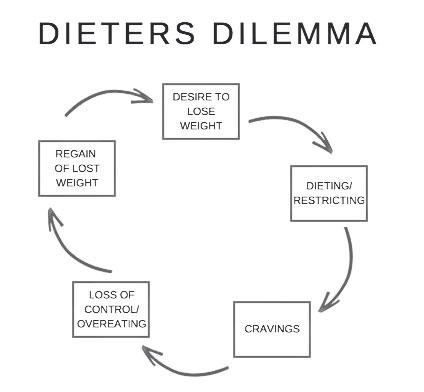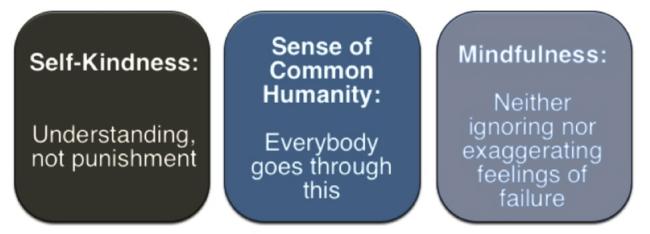
Ditching the Diet Mentality
What is dieting?
Dieting is the practice of restricting or manipulating food intake according to external rules —rather than internal cues like hunger and satisfaction—with the primary goal of changing body size, shape, or weight.
What are the hallmarks of diet culture?
- Equates thinness with health and moral virtue
- Demonizes certain ways of eating and elevates others
- Values following external rules over honoring body's internal signals
- Shame and stigma around bodies that don’t conform to the “ideal”
What are the dangers of diet culture?
- Increases risk of disordered eating and eating disorders
- Causes weight cycling, which can harm metabolism, heart health, and psychological well-being.
- Disconnects you from your body’s natural natural signals
- Fuels body dissatisfaction, weight stigma, and health inequities
- Dieting is the biggest predictor of weight gain!
Letting go of diet culture can be scary!
The reality is that the restriction and rules of dietculture make you more likely to overeat and feelout of control.
Tips for ditching diet the diet mentality
Tip #1: Reflect on what dieting has cost you
A social life: Dieting often means avoiding social events that involve food
Time: You may spend lots of time planning and preparing “diet-compliant” meals
Headspace: Dieting uses a lot of mental energy that could be used for other things
Physical health: Dieting often means you don’t fuel and nourish your body properly
Money: Most diets are centered around getting you to spend money
What else? Understanding what dieting has cost you is the first step in ditching the diet mentality.
Tip #2: Ditch the dieting tools
Example include:
Bathroom scale
Food-tracking app
Fitness tracker
Food scale
Measuring cups/spoons
“Diet-compliant” meal plans
These tools keep you in stuck in the diet mentality by reinforcing rules, obedience, and perfection.
Tip #3: Reframe diet thoughts
| Cognitive Distortion |
Example Thought | Reframed Thought |
|---|---|---|
| All-or-Nothing Thinking |
“I ate a cookie, so my whole day is ruined.” |
“One cookie doesn’t erase my progress. I can enjoy it and continue making balanced choices.” |
| Catastrophizing | “If I eat this, I’ll gain 10 pounds overnight.” |
“Eating one meal won’t drastically change my body. Long-term patterns matter more than single events.” |
| Labeling / Mislabeling |
“I’m a failure because I ate after 7 p.m.” |
“How I eat doesn’t define me. My self-worth isn’t tied to food choices.” |
| Should / Must Statements |
“I should never eat carbs if I want to be healthy.” |
“No food is inherently ‘bad.’ Balance and enjoyment are part of health.” |
| Emotional Reasoning |
“I feel guilty, so I must have done something wrong.” |
“Feelings of guilt are normal but not always accurate. I can assess choices calmly instead of punishing myself.” |
| Mind Reading / Assumptions |
“Everyone else eats perfectly, so I’m failing.” |
“I don’t know others’ habits. Comparing myself to others doesn’t reflect my own progress.” |
| Personalization | “I have extra weight; it’s all my fault.” |
“Many factors affect my body. I can focus on what I can control without self-blame.” |
Beware of these words that indicate a diet mentality!
- good/bad
- should/shouldn't
- can/can't
- never/always
- allowed/forbidden
- sinful/guilt-free
- slimming/fattening
- earn/burn
Tip #4: Practice self-compassion
The Three Elements of Self-Compassion
Self-compassion helps you ditch the diet mentality by:
- reducing shame and guilt around food
- replacing punishment with growth and learning
- helping you recover from lapses more quickly supporting sustainable change
Quick Self-Compassion Practice:
- Notice a judgmental thought: “I shouldn’t have eaten that.
- ”Pause and reframe with kindness: “It’s okay. I’m learning, and I can make a different choice next time.”
- Connect to humanity: “Everyone slips up sometimes; I’m not alone.”


